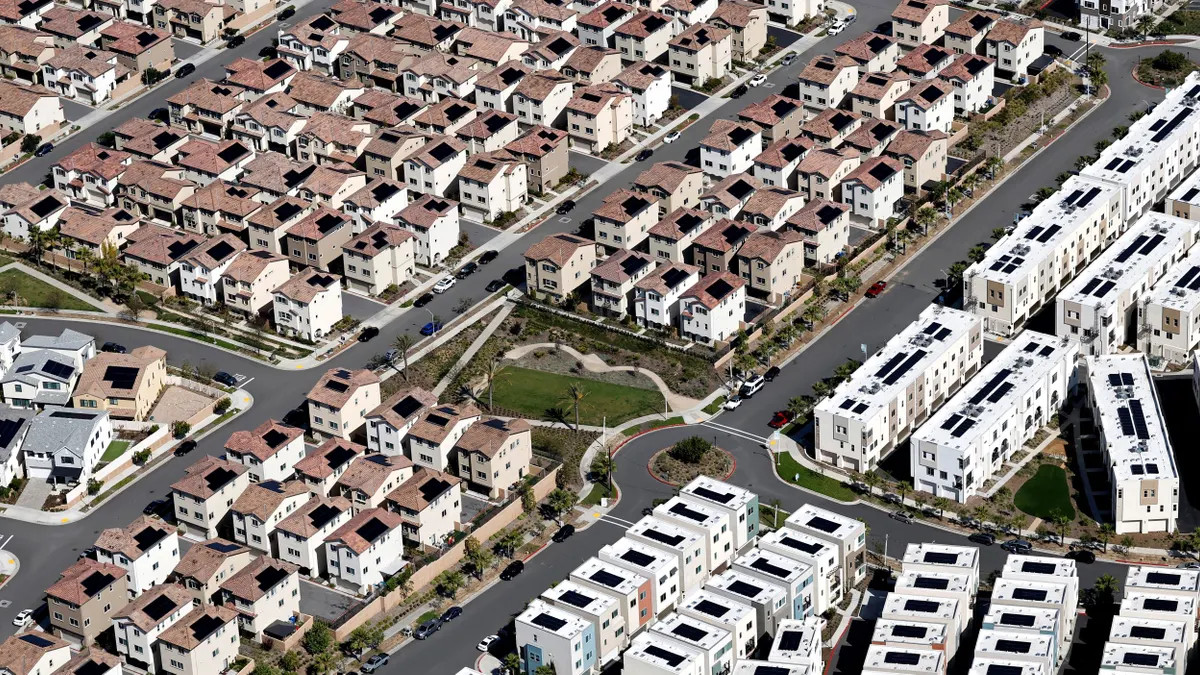Dive Brief:
- Sens. Martin Heinrich, D-N.M., and Susan Collins, R-Maine, introduced a bill on Monday to create a federal program to ease the permitting of distributed energy systems, including solar, battery storage and electric vehicle fast chargers.
- S. 2447 would appropriate $20 million annually, from fiscal year 2019 to 2024, for a new nonprofit organization under the Department of Energy, dubbed the Distributed Energy Opportunity Board, to streamline local permitting and inspection for qualifying systems.
- Distributed energy developers hailed the bipartisan bill for its potential to reduce installation costs for distributed resources, and ultimately incentivize increased adoption of clean energy technology. The bill will allow residential solar to be deployed "faster and better," according to a statement from the Solar Energy Industries Association (SEIA).
Dive Insight:
Providing quicker permitting for distributed systems is expected to reduce the soft costs of installation and adoption. The overall interconnection, permitting and inspection process costs for solar rooftop systems is about $7,000, or $1 per watt, according to SEIA.
Soft costs make up 64% of a new solar system's cost, according to a 2017 DOE report. The department's Office of Energy Efficiency and Renewable Energy has issued a number of awards to help lower soft costs, including up to $17 million of new research funding in 2019 to reduce the red tape associated for solar and solar-plus-storage system installations, for direct siting and permitting costs or financing, and compliance with local codes and regulations.
But additional steps are required to help distributed energy systems, according to Heinrich.
"The current patchwork of permitting requirements across local jurisdictions causes delays and increases costs for both local governments and the businesses and homeowners who want to build smaller-scale renewable energy systems," Heinrich said in a statement.
The $20 million annual appropriation for the Distributed Energy Opportunity Board would create and maintain a voluntary permitting process, "such as a national online permitting system and technology platform for expediting, standardizing and streamlining permitting, that authorities having jurisdiction may use, at the discretion of those authorities, to receive, review and approve permit applications relating to qualifying distributed energy systems."
The Distributed Energy Opportunity Board would also study and potentially develop national certifications for distributed energy installers and qualifying systems, help local jurisdictions with the technical aspects of permitting and create a voluntary national inspection protocol for distributed energy systems.
The effectiveness of streamlined permitting for solar has already been shown across the country.
California passed a bill in 2014 to require city and county governments to streamline the permitting process for small residential solar systems, according to the National Conference of State Legislatures.
Los Angeles adopted an online permitting application process in 2014 specifically for solar systems, changing a process that previously involved back-and-forth between permitting agencies to an instantaneous system. Other cities like Las Vegas and counties in Nevada and Florida have also established online permitting for residential solar, according to a Senate staffer.
Under S. 2447, residential clean energy technology will be adopted with simpler processes and more affordable solutions, according to Thomas Plagemann, chief commercial officer and EVP of capital markets at Vivint Solar.
"This bill does both by cutting unnecessary red-tape and delays related to permitting, helping to reduce the burden on local government resources without compromising on consumer safety," Plagemann said in a statement. "This collaborative approach represents a common-sense solution because ultimately local governments and solar providers are both striving to provide a good experience for the same customers."
Collins said S. 2447 will pair with another bipartisan effort she introduced this summer to promote energy storage, S.1602. That legislation, which has a companion bill introduced in the House, specifically aims to spur research and development of grid-scale battery storage.















